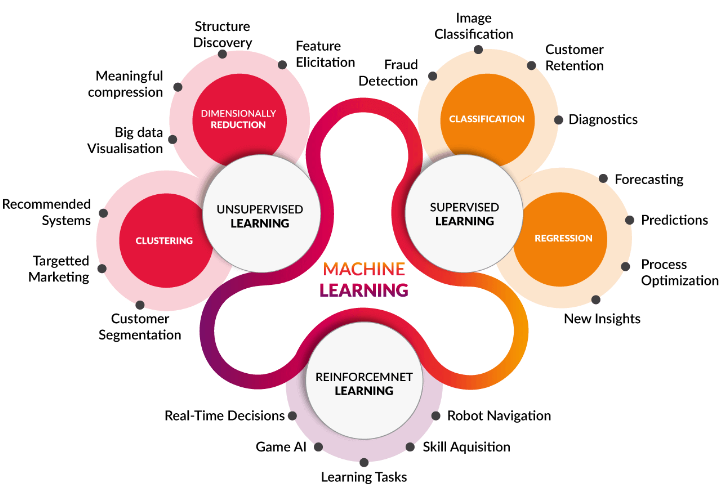How can industries leverage Machine Learning
The ways Industries Leverage Machine Learning

In this article I explore use cases in different industries - Healthcare, Retail and Financial Services and opportunities to leverage Artificial Intelligence.
A) #HEALTHCARE AI

1. IoT sensors and portable diagnostics:
- Wearable devices & sensors are used to assess patient's health. Digital health platforms continually monitor vital signs using sensors (worn on the body) info is sent to a ML analytics center to flag anomalies.
2. Image analysis:
- Machine learning systems are being tested to improve medical image reconstruction, noise reduction, quality assurance, segmentation, computer-aided detection, computer-aided classification & radio genomics.
3. Robotic surgery:
- Robots perform procedures for orthopedics, urology, general surgery, gynecology, neurology, thoracic, otolaryngology, bariatric, rectal & colon, oncology, dental implants & hair transplants.
B) #FINANCIAL SERVICES AI

1. Fraud detection:
- Fraud & anomaly detection - using geolocations, IP addresses, differences in billing & shipping addresses, purchase amounts versus regular activity.
- Leveraging AI algos results in more accurate predictions & improved customer service.
2. Credit decisions:
- Affordability scoring considers financial data - income, banking history, tax payments, however inclusivity is lacking.
- Newer AI systems ++alternative data like social media, geolocation data, and other smartphone info & behavioral traits for patterns & insight (consent to data usage is key).
3. Robo-advisors:
- Can provide automated financial guidance, portfolio management & servicing advice using algos & stats to manage investment portfolios.
4. Insurance & Robo-advisors:
- Deliver services from handling insurance claims, obtaining quotes to streamlining back-office administration.
5. Property evaluations:
- Use of computer vision and machine learning to take existing geospatial imagery to create a property information database.
- Use of images of homes to establish the value & speeds up the insurance quote process for insurance companies & bond originators.
6. Sentiment analysis:
- review of enormous volumes of unstructured data (videos and video transcriptions, photos, audio files, social media posts, presentations, webpages, articles, blogs) to determine positive/ negative sentiment.
7. Language Translation:
- For forms, education, e commerce BOTs.
C) #RETAIL AI

1. Personalisation:
- ML systems capture, analyze, and use data to personalize the shopping experience.
- Recommend complementary products or services.
2. Clustering:
- Algorithms are used to discover similarities/ differences in customer data (targeted marketing & segments) - present online shoppers with personalized product recommendations while adjusting pricing, vouchers, incentives in real time.
3. Predictive analytics:
- For demand forecasting, replenishment, guidance on stock levels & new store location.
4. Sentiment analysis:
- review of enormous volumes of unstructured data (videos and video transcriptions, photos, audio files, social media posts, presentations, webpages, articles, blogs) to determine positive/ negative sentiment.
6. Language Translation:
- For forms, education, e commerce BOTs.
5. Object Detection
- Identify product through images for stock replenishment and sales process.
- Also have a look at my Use Case Model for Object Detection from Images using Microsoft Custom VisionAI
For more Follow me on Medium https://medium.com/@aveshnee7
